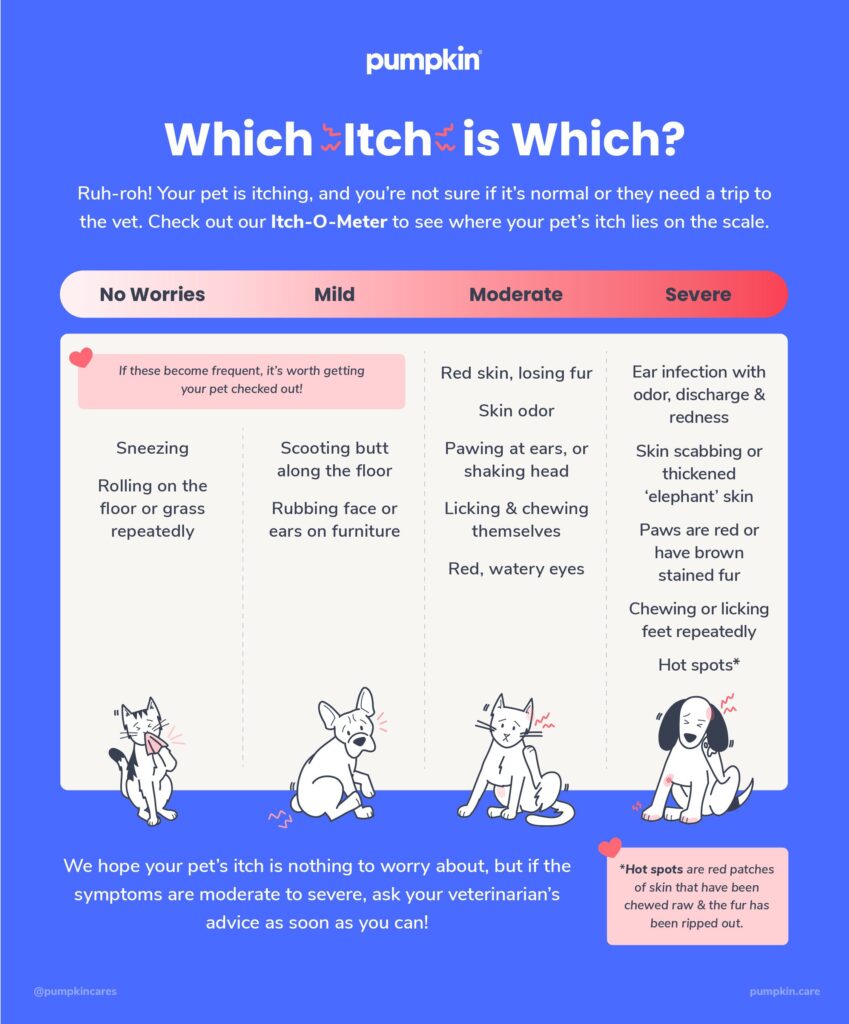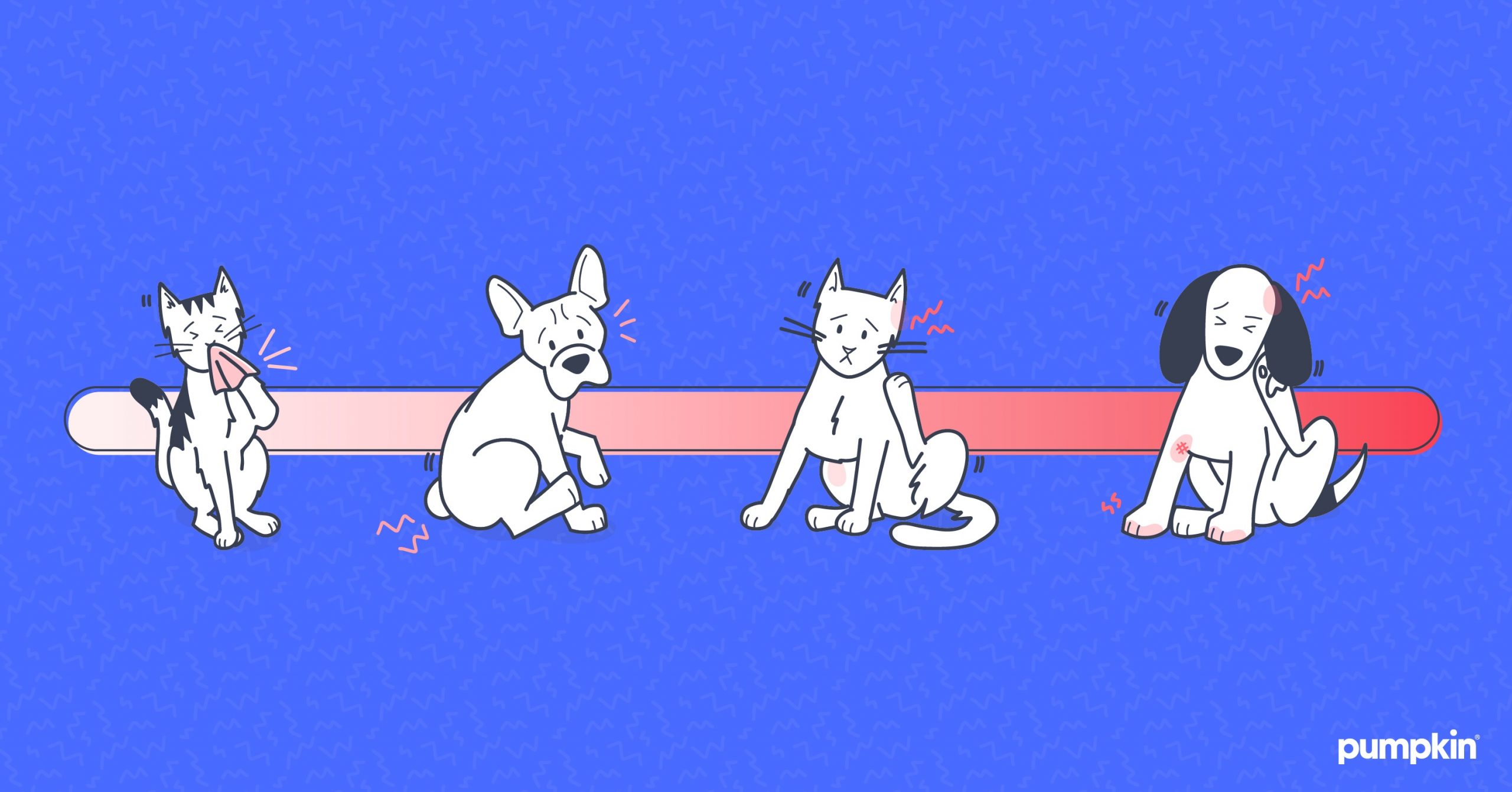Is your pet regularly scratching and chewing themselves? Have you heard their tags rattling because they are shaking their head and digging at their ears? Or maybe their skin flares up and gets red or bumpy, or their eyes are red and watery? These could be signs your pet is experiencing a bothersome itchy sensation.
To help pet parents be more aware of the signs of itch in pets, the causes of itching in pets, and what to do about it, Zoetis has dedicated the month of August to Itchy Pet Awareness Month. If your pet is experiencing itchiness, don’t panic! Let’s explore what might be causing it.
Is my pet itchy?
Sometimes the signs of itchiness in pets are subtle, other times they are very obvious. Signs that a dog or cat is itchy can include some or all of the following:
- Licking, biting, chewing, or scratching themselves repetitively
- Rubbing their face or ears along furniture
- Pawing at their ears, or shaking their head repeatedly
- Recurrent ear infections, with odor, discharge, and redness
- Losing hair anywhere on their body
- Chewing or licking their feet, red toes, brown-stained fur on paws, feet are wet from licking paws repeatedly
- Thickened, elephant skin
- Skin odor
- Red skin
- Hot spots: patches of skin that have been chewed raw and hair has been ripped out
- Rolling on the floor or grass repeatedly
- Red, watery eyes
- Sneezing
- Scooting
- Scabbing where a pet has been excessively licking, scratching, or chewing

Why is my pet itchy?
The medical term for itching is pruritus, which means the sensation that causes an itchy feeling. The itching sensation is triggered by the immune system, which sends chemical signals to the nervous system that identifies the perception of itching. Once your pet notices the itching sensation, they start to scratch, chew, rub, roll, and lick – anything to get it to stop.
Needless to say, itchy pets feel miserable! Constant itching negatively affects the health of your pet’s skin, their behavior, and their sleep. Darin Dell DVM, DACVD notes that “even mild allergy symptoms can have a significant negative impact on a dog’s comfort and quality of life.” If you have ever been itchy and unable to get it to stop, then you know how your pet feels.
There are several different causes of itching in dogs and cats. The following is a list of potential causes.
Allergies
Allergies are one of the most common causes of itching in dogs and cats and there are a few different types.
Dogs and cats can have a flea bite allergy, and the bite of just one flea can cause intense itching in these pets. Cats with flea allergies tend to develop miliary dermatitis, which manifests as bumps all over their body. Dogs that are allergic to fleas tend to chew or scratch themselves raw, creating hot spots around their tail, face, or neck. You may see the parasites themselves or see flea dirt, which is the feces fleas leave behind on the skin of dogs and cats. Gross…we know. Stephen D. White, DVM, DACVD also notes that a “flea allergy is important to treat not only for the discomfort from the flea bite but also because fleas can be vectors of disease for both pets and people.”
Otherwise known in veterinary medicine as atopic dermatitis or atopy, seasonal allergies also can affect our fur friends. These allergies cause hypersensitivity in dogs and cats to common substances like pollen, dust mites, mold mites, and insect particles. This reaction results in an itchy skin disease that is inflammatory and keeps coming back, year after year, at the same time, and often gets worse.
Seasonal allergies are affected by genetics, the structure of the skin, and the immune system. They impact the skin, the eyes, and the respiratory system. Pets with seasonal allergies usually first develop symptoms in the first couple of years of their life, but any age of pet can be affected. Signs your pet may have seasonal allergies usually include:
- Scratching
- Rubbing
- Licking
- Recurrent ear infections
- Sneezing
- Itchy, watery eyes
- Secondary bacterial or fungal skin infections
Another type of allergy in pets is food allergies which are caused when a pet has an adverse reaction to an ingredient in their food. The most common causes of food allergies in pets are chicken, beef, eggs, dairy, and soy. The signs are similar to seasonal allergies, however, the itching is non-seasonal, and occurs any time the pet eats the offending food. Pets with food allergies can also have gastrointestinal signs, including excessive gas, diarrhea, or chronically loose stool.
Dogs and cats can also develop contact dermatitis, which is an irritation due to prolonged physical contact with various substances. Substances can include plants, detergents, mulch, fertilizer, concrete, wool or synthetic carpets, fabric cleaners, carpet deodorizers, rubber chew toys, etc. If a pet is laying on the substance, then their belly, armpits, and groin are usually itchy and red. If they are chewing on it, then their lips and muzzle are red and itchy.
Darin Dell DVM, DACVD also notes that “Allergy symptoms usually worsen with age. Seeking veterinary care early helps reduce the risk of secondary problems like skin and ear infection.”
Bees sting and mosquitoes bite pets too, and it causes the same pain, itch, and swelling as it does in people. Pets may rub, scratch, or paw at the affected area, and there is usually a distinct swelling.
Parasites
Most common
Fleas are the most common external parasites that cause itching in dogs and cats.
Skin mites including Sarcoptes, Notoedres, Demodex, Otodectes, Cheyletiella, and Trombicula (chiggers) are common parasites that cause itching and hair loss in dogs and cats. Mites are microscopic: you cannot see them with your naked eye. They cause itching, redness, and hair loss.
Less common:
Lice: Biting or sucking lice can cause itching, restlessness, and matted hair usually in young or neglected pets.
Cuterebra: A parasite that lays its eggs near rodent burrows, hatched larvae can infest dogs and cats, causing a local swelling that may be itchy.
Parasitic worms: Hookworm dermatitis can cause red, itchy, inflamed toes in dogs. Pelodera, a rare parasite, can also cause severe itching in dogs.
Bacterial and fungal skin infections
While dogs and cats have microorganisms that normally live on the surface of their skin, sometimes yeast or bacteria can overgrow and cause itching. Staphylococcal bacterial infections cause itching, redness, pimple-like bumps, skin crusting, and hair loss, and if left without treatment, can result in thickened skin. Bacteria can also invade hair follicles and cause severe inflammation. Malassezia pachydermatis is the most common yeast infection in pets, and if it overgrows, causes itching, redness, hair loss, scaly, thickened skin, skin odor, and ear infections. Most Staphylococcal and Malassezia overgrowths in dogs and cats are usually secondary to other underlying problems, usually allergic or hormonal in nature.
Ringworm: Caused by fungal spores that can infect your pet’s skin (and your skin!), ringworm causes itching, hair loss, and redness. Ringworm is infectious, and while it can occur in any pet, it is usually seen in younger pets.
Seborrhea: Common in some dog breeds, seborrhea is a hereditary disorder that affects the growth of the skin. Symptoms include itching, excessive dandruff, a dull, dry haircoat, greasy skin, and waxy ears.
Skin Cancer: Mast cell tumors and cutaneous lymphoma are skin cancers that can cause varying levels of itch and can mimic other less serious skin disorders.
Auto-immune Disorders
Pemphigus is the name for a group of auto-immune skin disorders that can cause itching and pain in dogs and cats. Signs of auto-immune skin disorders can also include scaly skin, dandruff, skin infections, crusty noses and footpads, hair loss, inflamed nailbeds, and low energy.
Stress
Dogs and cats that are stressed may feel itchy and lick themselves excessively to relieve stress. Cats can remove large sections of hair, and dogs can create self-induced skin lesions known as acral lick dermatitis, a local area of swelling, hair loss, and redness.
What should I do if my pet is itchy?
Sometimes, a pet can have more than one cause of itching at the same time! Thankfully, your veterinarian can sort out the cause(s) of itching in your pet by listening to what you are observing at home, conducting a full physical examination, running some tests, and seeing how your pet responds to prescribed treatment.
If you notice any of the signs described in this article, then your pet may be itchy. The best thing you can do is make an appointment with your veterinarian so you can discuss your concerns. Your veterinarian is your best resource for determining why your pet is itchy and resolving it quickly, so you can both get back to living your best itch-free life.
For more information on how you can better prepare for a skin health visit, check out this article from Zoetis with some of the questions your veterinarian may ask.
A visit with your vet can make all the difference when it comes to healing your pet’s mysterious itchiness – but treatment can be costly. A pet insurance plan is a great way to help protect your pet in the future. Learn more by clicking here!
DISCLOSURE




